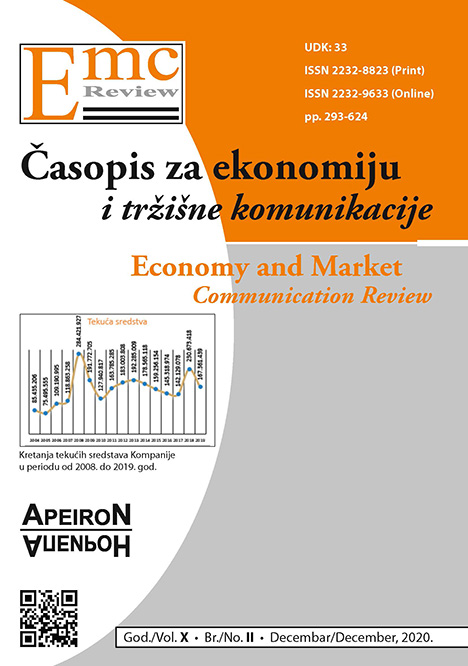STANCES OF INTERNATIONAL ORGANIZATIONS ON POVERTY AND UNEMPLOYMENT IN BOSNIA AND HERZEGOVINA
DOI:
https://doi.org/10.7251/EMC2002413JAbstract
The nation-states retained their target as the basic political units in international relations, with significant influence of the leading economic and military forces in them. Modern international organizations can be classified as government international organizations and non - government international organizations. In the first case, they are financed from government budgets, and non - governmental international organizations have funding sources mainly from state budgets, as well as from other institutions. (Andrew Duff, 2007) . International organizations in Bosnia and Herzegovina carry out a large number of projects in the post-war period, and above all it relates to: improving the economy, increasing the competitiveness of producers, gender equality - Gender, improving institutions, supporting returnees, supporting small and medium-sized businesses, reducing unemployment, combating poverty etc. From the above, it can be concluded that a large number of projects are geared towards developing the economy and combating unemployment and poverty, which will be the primary research of this paper. The analysis of International Organizations raises the question of the very purpose of project design in the host countries. The assumption is that it is twofold, both for the host state and for the (state) institutions that fund it. The first is that governmental international organizations are preparing a good business environment for their markets through International Organizations, and are expanding their influence there. The public institutions and the host country’s domestic economy are preparing for the cooperation and eventual entry of their large companies and other interests. On the other hand, there are also non - governmental international organizations, which mainly deal with humanitarian projects and economic ones to a lesser extent. Accordingly, it is justifiable to set the basic aim of this paper’s research: To research and present in tables, graphically, and to interpret theoretically the extent to which international organizations in Bosnia and Herzegovina have had an impact in combating poverty and reducing the unemployment rate, and whether there is a difference between accesses in other host countries. In the preliminary research for this paper, it was established that there is no quality data on the invested funds in this segment by the International Organizations, so the primary data collection was started. Primary data were collected from representatives of international organizations, employees of international organizations, as well as foreign diplomacy. The results of the analysis show the impact of the projects they have implemented on poverty alleviation and unemployment in Bosnia and Herzegovina. According to the above, it is possible to set the basic hypothesis of the work, which states: International organizations represented in the territory of Bosnia and Herzegovina did not adequately answer the task when it comes to reducing unemployment and combating poverty. In addition to the basic hypothesis of the work, there is an auxiliary one, which reads: International organizations in Bosnia and Herzegovina have contributed more to poverty reduction than has been the case with reducing unemployment.
